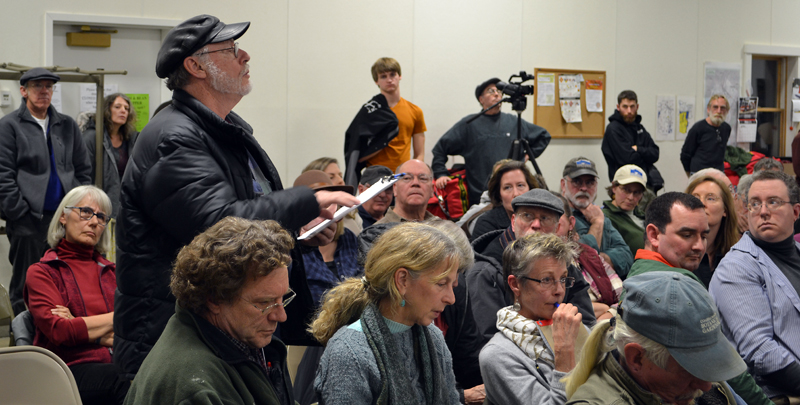
Alna resident Ray Robitaille asks a question about Ed Pentaleri’s presentation during a public hearing about the upcoming school choice referendum at the Alna fire station Monday, March 5. (Maia Zewert photo)
It was standing room only at the Alna fire station the evening of Monday, March 5, where, over the course of 3 1/2 hours, residents and town officials discussed an upcoming referendum vote regarding the town’s school choice policy.
Resident Ralph Hilton submitted the petition for the referendum, which would modify Alna’s school choice policy to restrict the town’s commitment to pay for school tuition, up to a certain amount, to only public schools. The town would continue to pay tuition for high school students attending either public or private school. The change, if approved by voters, would go into effect June 30 and apply only to children who become residents after that point.
Children who live in Alna as of June 30 would not be affected by the change, according to the referendum. However, Sheepscot Valley Regional School Unit Superintendent Howard Tuttle said the RSU has not obtained a legal opinion on the matter.
“That has not been looked into, not by the RSU,” Tuttle said in a phone interview Tuesday, March 6. “We’ve talked to our attorneys to some degree about this, but the RSU has not gotten a legal opinion on this. If it passes, we certainly will.”
Tuttle said the Alna vote is the first part of a three-step process. The RSU 12 Board of Directors would have to approve the change with a two-thirds majority of the board. Each town in the district would then have to vote to approve an amendment to the reorganization plan, Tuttle said.
With the upcoming referendum vote, school choice has become a contentious issue in the town. After several meetings of the Alna Board of Selectmen included lengthy public comment sessions on school choice, the selectmen decided not to accept public comment for any item not on the agenda until after the vote.
Residents have also received mailers about school choice over the past few weeks, both from the selectmen and Alna for Choice in Education, a group of residents advocating to keep the current policy. The group also held a community potluck and visited fellow residents to talk about the upcoming vote.
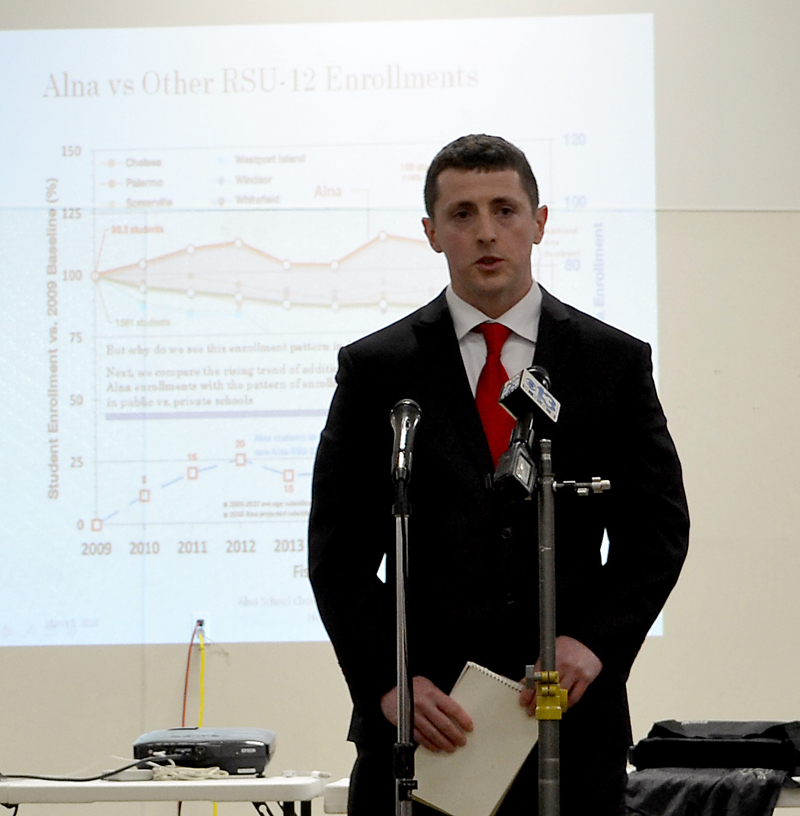
RSU 12 Board of Directors representative Spencer Bailey speaks in favor of changing Alna’s school choice policy during a public hearing Monday, March 5. (Maia Zewert photo)
The selectmen have also received multiple Freedom of Access Act requests for information and communications related to school choice, the most recent of which the board discussed at its Wednesday, Feb. 28 meeting. Damariscotta attorney Peter Drum submitted a request via email Feb. 23 for copies of all documents, files, and communications related to school choice from Jan. 1, 2013 to the present. One of the specified items includes a list of all students, what school they attended, the address of the school, and whether the school was public or private.
The selectmen expressed frustration about the numerous requests, which Third Selectman Doug Baston said was “just another way to harass us.” He estimated it would take the town “about 50-60 hours’ worth of work” to gather the documents and redact any identifying information about the students.
The selectmen will seek advice from town attorney David Soule regarding the request.
Drum also asked for any information that caused town officials to suspect fraud or any other crime or civil claim in regard to school choice. For the March 5 public hearing, the selectmen prepared a handout detailing different cases of “abuse” they have encountered over the years. The handout included five cases of abuse in which parents applied to have tuition paid for their children. In all cases, the students were attempting to attend private school, Baston said.
At the March 5 hearing, resident Ed Pentaleri provided an independent analysis regarding whether the town’s school choice policy has negatively impacted property taxes.
Pentaleri said the selectmen and Hilton asked him to perform the analysis, which he agreed to do on the condition that he could present his conclusion whether it supported Hilton’s petition or not.
Using 2009, the year RSU 12 was created, as his baseline, Pentaleri compared the enrollment of students from Alna to other schools in the district. According to his presentation, Alna’s enrollment continues to trend upward, while all other towns in the district have seen declining enrollment.
In addition, the majority of Alna’s students now attend private schools as opposed to public schools, Pentaleri said. Of the 115 students, 53 percent attend private schools while 47 percent attend public schools.
Taxpayers in Alna have experienced an increase in their property taxes due to rising enrollment, Pentaleri said. According to his presentation, property owners paid about $314 more per $100,000 of property value in the current fiscal year. Pentaleri said that amount is likely to increase in future years if the enrollment trend continues.
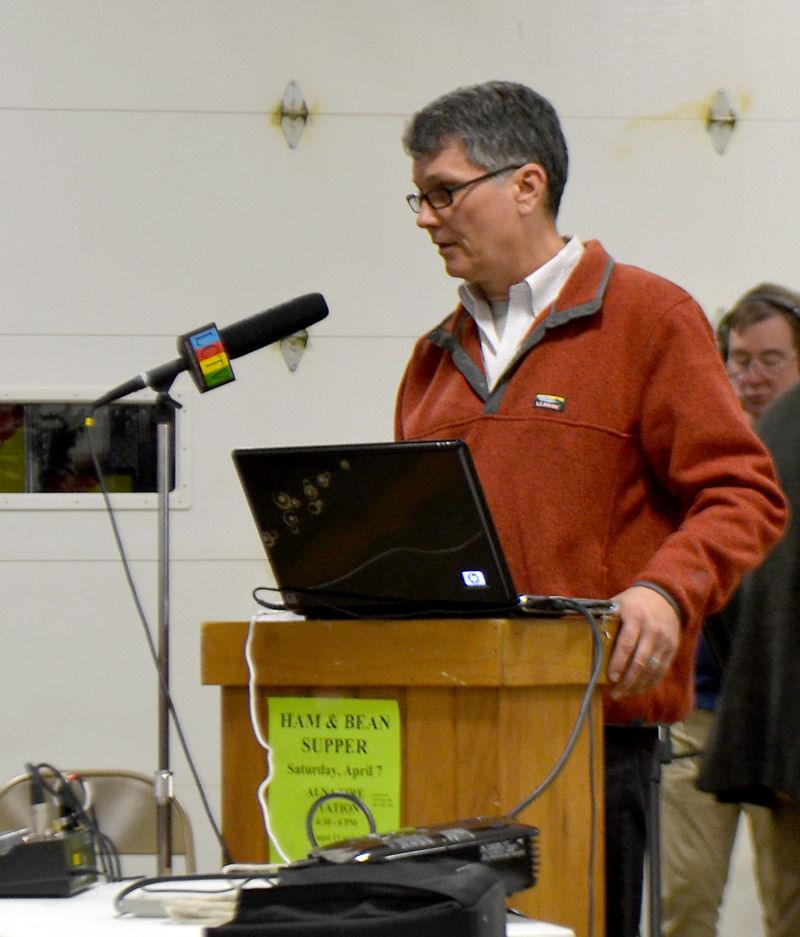
Alna resident Ed Pentaleri discusses the data he used in his presentation about the town’s school enrollment during a public hearing Monday, March 5. (Maia Zewert photo)
Members of the audience, many of whom later spoke against the referendum question, asked Pentaleri about the data presented, and how many of Alna’s students attending private school are in high school.
Former Second Selectman Jonathan Villeneuve, who identified himself as a member of Alna for Choice in Education, said the group has found data that suggests that a majority of the students attending private school are high school students attending Lincoln Academy in Newcastle.
Others asked Pentaleri if he had considered any other explanatory variables as to why Alna’s student population increased compared to other schools in the RSU, such as the quality of life the town offers. One resident asked about the town’s increase in students attending private schools instead of public schools and whether it could be linked to the quality of education in the RSU, a question that met with applause from many in the audience.
Pentaleri said he didn’t have the answers to those questions, and had conducted his analysis based on numbers, not outside factors.
Following Pentaleri’s presentation and the subsequent questions, moderator Carl Pease opened the floor for comments from those who had signed up to speak at the beginning of the meeting. Those in favor of the referendum spoke first, followed by those against the referendum. Individuals neither for nor against the question spoke last.
Spencer Bailey, who represents Alna on the RSU 12 Board of Directors, spoke in favor of the proposal to change school choice and said neither taxpayers nor children would benefit from a no vote.
“The intent in raising public funds for public education was to give everyone a fair and equal start at life, and when public funds go to private schools, that obviously doesn’t happen,” Bailey said. “No parents actually benefit from a no vote on the referendum. The only people that actually benefit are the businesses – the landlords, the developers, and the private schools, and ultimately their bottom line is profits. It doesn’t include the taxpayers, and it doesn’t include the kids.”
Residents Fred Bowers and Susan Marcus also spoke in favor of amending school choice. Marcus said public money should support public schools.
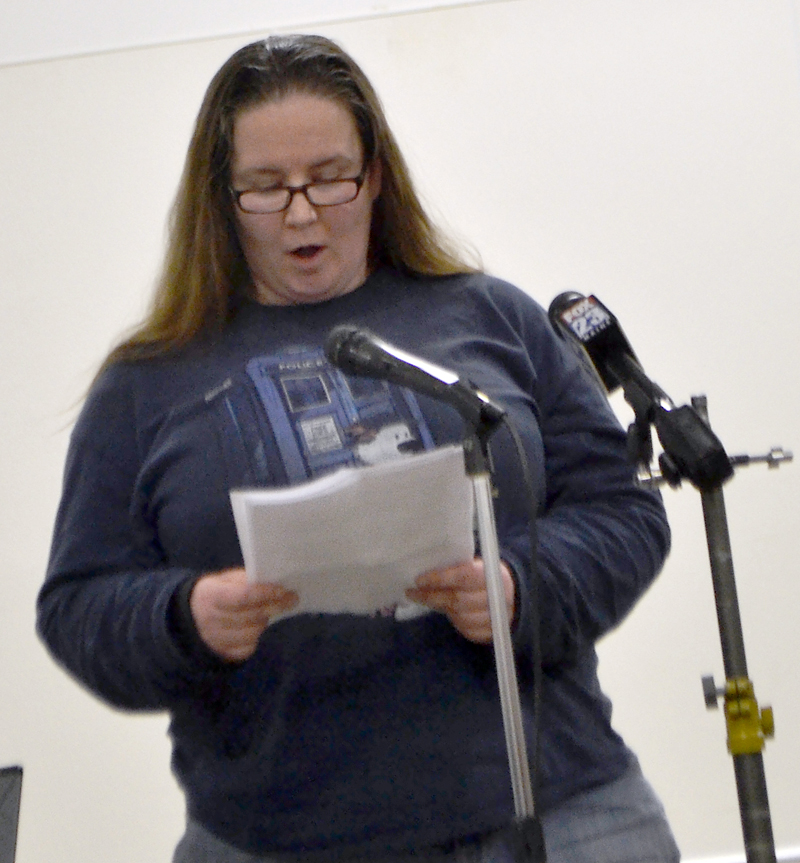
Alna resident Ona Brazwell reads a statement in favor of keeping the town’s school choice policy the same during a public hearing Monday, March 5. (Maia Zewert photo)
“I have nothing against private schools, but I think that’s a choice the parents make,” Marcus said. “The parents make the choice to send their kids to public school or private school, and if it’s private school, then that’s the parents’ decision and the parents’ responsibility.”
The majority of comments, however, came from residents stating opposition to the referendum, many of whom identified themselves as parents and members of the Alna for Choice in Education group before reading prepared statements.
Resident Ona Brazwell identified herself as a single mother to twin boys attending Juniper Hill School for Place-based Education, a private school in Alna, and a tenant of Judy Fossel. Fossel’s advertisement for the rental, which said the barn was “available for school-year rental in a school choice town” has been criticized by the selectmen over the past two years.
Brazwell said she “found Alna by accident” while looking at a farm in Whitefield and immediately fell in love with the town, the community, and Juniper Hill. She signed a lease to move into Fossel’s rental while she attempted to purchase her “dream house” in Alna. The house sold two days after she moved into Fossel’s rental, she said.
Six months into the lease, Brazwell said she received a visit from Second Selectman Melissa Spinney, who “implied I had been deliberately defrauding the town.”
In an April 2017 email exchange between Spinney and Brazwell made available to The Lincoln County News by Spinney, Spinney said she visited Brazwell to inform her of the residency issue and say she “would like to see a happy end to the situation.”
“Being a renter doesn’t make Alna any less my home. This town and the people in it are precious to us and I am an active participant in this community,” Brazwell said. “I find it strange that no one challenged my residency when I was in the voting booth to vote for the selectmen sitting behind me or when I bought my car last summer and came in to pay my $400-plus excise tax, but when it comes to educating my children, I’m being questioned at every turn.”
A few of the speakers referenced the ongoing conversation in Whitefield regarding the state of its elementary school. In recent months, parents with students in Whitefield Elementary School have expressed concerns about bullying and the school administration’s response to it and other issues. Keith Marple, one of Whitefield’s representatives to the RSU 12 board, has called for the town to withdraw from the district.
During the March 5 public hearing, Marple urged Alna residents “not to go down the road Whitefield has gone down.”
“The fact that your homes are worth so much, the fact that you have schools competing for your children, the fact that you have such a beautiful town, I don’t want to see what happened to Whitefield happen to you, and that’s what I see happening right now,” Marple said.
When it came time for those who were neither for nor against the referendum to speak, only two people were still in the audience and did not ask to have their comments postponed until the following meeting.
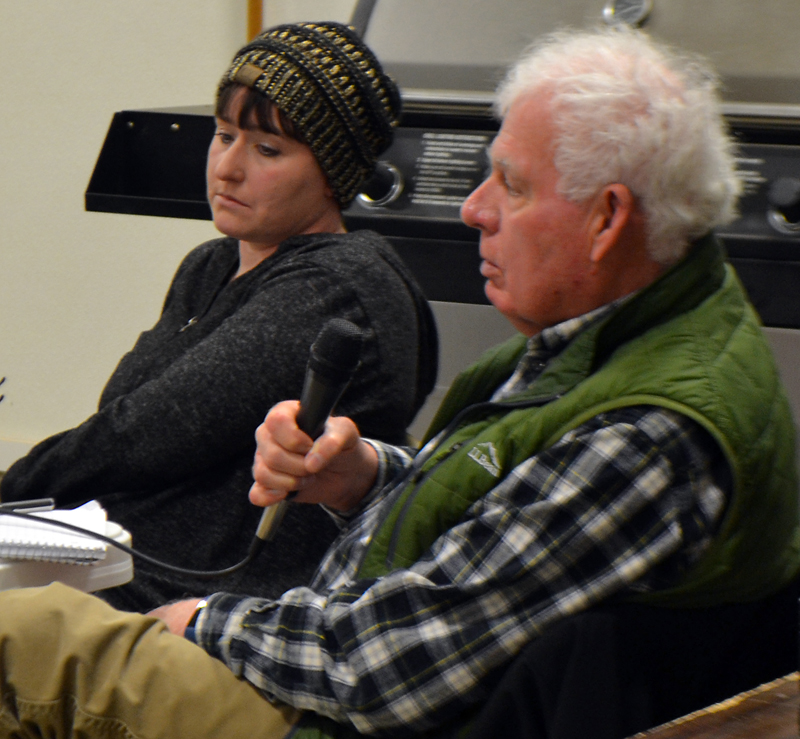
Alna Third Selectman Doug Baston responds to a question while Second Selectman Melissa Spinney looks on during a public hearing regarding school choice Monday, March 5. (Maia Zewert photo)
Shanon Cotta, who, along with Spinney, is running for first selectman, said he has “been appalled at the hostility at the leadership level” surrounding school choice, and the tone of the conversation needs to change.
“We need to come together as a community and stop this negativity,” Cotta said.
A woman in the process of moving to Alna said she was “struck by the pain on both sides of the issue” and asked if there was a way to delay the vote until a compromise proposal could be reached. She received a round of applause from the audience for her suggestion.
Residents who did not have a chance to speak will have the opportunity to do so at another public hearing beginning at 6 p.m., Monday, March 12 in the fire station. Two additional hearings will also take place that evening for two referendum questions to allow local businesses to sell alcohol for on-site consumption.
Villeneuve and Alna General Store co-owner Ken Solorzano submitted the petitions, which were discussed during the Alna selectmen’s meeting Feb. 14. One of the petitions would allow on-site consumption for every day of the week, while the other excludes Sunday, according to Town Clerk Liz Brown.
Voters will have the final say regarding school choice and on-site consumption of alcohol during a vote by secret ballot Friday, March 23. The vote coincides with the election of officers before the open portion of town meeting the morning of Saturday, March 24.
(Editor’s note: An earlier version of this article online and in the March 8 print edition reported that a change in school choice policy would not affect current K-8 students in private schools. In fact, the change in policy would not affect any child living in Alna as of June 30, pending a legal review by RSU 12.
The full text of the question is as follows: “Shall the Town of Alna’s school choice policy be amended so that after June 30, 2018, all Alna K-8 resident students will have the right to attend, at public expense, any public school of the parent’s choice at which the student is accepted, except that any child who is living in Alna as of June 30, 2018, and continues to live in Alna shall also continue to have the right, at public expense, to attend any public or approved private school of the parent’s choice at which the student is accepted?”)






